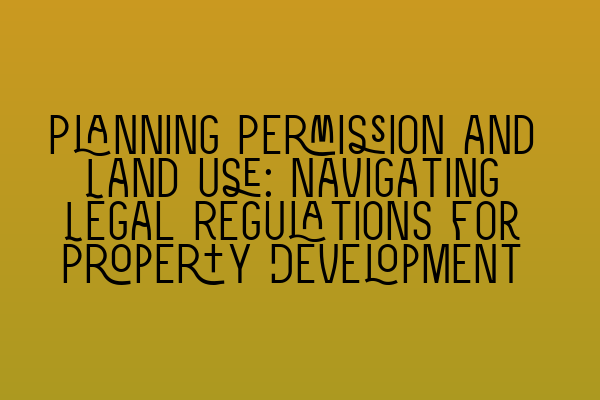Planning Permission and Land Use: Navigating Legal Regulations for Property Development
Property development can be an exciting venture, providing opportunities for growth and investment. However, before embarking on any development project, it is crucial to understand the legal requirements and regulations surrounding planning permission and land use. Navigating these complex legal frameworks is essential to ensure compliance, avoid penalties, and safeguard the success of your project.
In this article, we will delve into the intricacies of planning permission and land use regulations, shedding light on key considerations and providing insights to help you navigate this legal landscape. We will explore the importance of planning permission, the process involved, and the legal implications of non-compliance. So buckle up and let’s dive in!
Why is Planning Permission Important?
Planning permission is a legal requirement in most countries for any development or change in land or property usage. It acts as a safeguard to ensure that the proposed development aligns with existing zoning regulations, environmental considerations, and community interests. Acquiring planning permission is crucial for several reasons:
- Legal Compliance: Without planning permission, your development could be considered unauthorized, leading to legal consequences, enforcement action, and even demolition of the project. It is essential to obtain the necessary permissions before commencing any work.
- Environmental Impact: Planning permission takes into account environmental factors, such as ecological preservation, sustainable development, and infrastructure needs. By obtaining permission, you contribute to the responsible and sustainable growth of the community.
- Property Value: Having planning permission adds value to your property. Prospective buyers or investors are more likely to be attracted to a property that already has planning permission, as it reduces potential risks and uncertainties.
The Planning Permission Process
Now that we understand the importance of planning permission, let’s explore the process involved in obtaining it:
- 1. Initial Research: Before starting the planning permission process, conduct thorough research to understand the local regulations, zoning restrictions, and any specific requirements unique to the area. Familiarize yourself with the Local Planning Authority (LPA) and its policies.
- 2. Pre-application Consultation: Engage in a pre-application consultation with the LPA to discuss your proposed development. This consultation provides an opportunity to seek guidance, clarify expectations, and address any concerns. It helps identify potential issues and facilitates smoother communication throughout the process.
- 3. Submitting the Application: Prepare and submit a detailed planning application to the LPA. This application should include architectural drawings, proposed site plans, environmental impact assessments, and any other supporting documents to demonstrate the feasibility and compliance of your development.
- 4. Public Consultation and Consideration: The LPA will undertake a public consultation process, allowing affected parties and stakeholders to provide feedback on the proposed development. This feedback is considered in the decision-making process, along with various other factors such as local policies, environmental impact, and community interests.
- 5. Decision and Appeals: The LPA will make a decision on your planning application, either granting permission, granting permission with conditions, or denying permission. If the application is denied, you have the right to appeal the decision within a specified timeframe. It is essential to seek legal advice during the appeals process.
Keep in mind that the planning permission process can vary slightly depending on the jurisdiction and the nature of the development. Consulting with experienced professionals, such as property lawyers and planning consultants, can help you navigate the process more effectively and increase your chances of success.
Legal Implications of Non-Compliance
Non-compliance with planning permission regulations can have significant legal implications. Let’s explore some potential consequences:
- Enforcement Action: If you commence development without appropriate planning permission, the LPA can take enforcement action against you. This action may involve halting construction, issuing stop notices, or even taking legal action to compel compliance or seek demolition of the unauthorized development.
- Financial Penalties: Failure to comply with planning permission requirements can result in financial penalties, which may include fines, compensation payments, or the requirement to rectify the unauthorized development at your own expense. These penalties can be substantial and have a significant impact on your finances and project timeline.
- Damaged Reputation: Non-compliance can tarnish your reputation as a developer or investor. Engaging in unauthorized development reflects poorly on your professionalism, integrity, and ability to adhere to legal requirements. This can have long-term consequences, affecting future business opportunities and partnerships.
It is essential to prioritize legal compliance and obtain the necessary planning permission to avoid these potential legal pitfalls. Engaging with legal experts who specialize in property law can provide the guidance and support needed to navigate this complex landscape successfully.
Conclusion
Understanding and navigating planning permission and land use regulations is paramount for any property developer or investor. By securing the necessary planning permission, you ensure legal compliance, contribute to the sustainable growth of your community, and protect the value and success of your project.
If you’re interested in learning more about property law and related legal topics, be sure to check out our related articles:
- SQE Contract Law: Analyzing Landmark Cases and Influential Judicial Decisions
- Understanding Contractual Capacity: Rights and Limitations
- Interactive SQE Mock Tests for Contract Law: Test Your Knowledge
- Join Our SQE Contract Law Webinars: Expert Insights and Guidance
- SQE Prep: Mastering the Essentials of Contract Law
At SQE Property Law & Land Law, we have a team of experienced solicitors who specialize in property law and can assist you with all aspects of planning permission and land use regulations. Contact us today for expert advice and support with your property development ventures.
